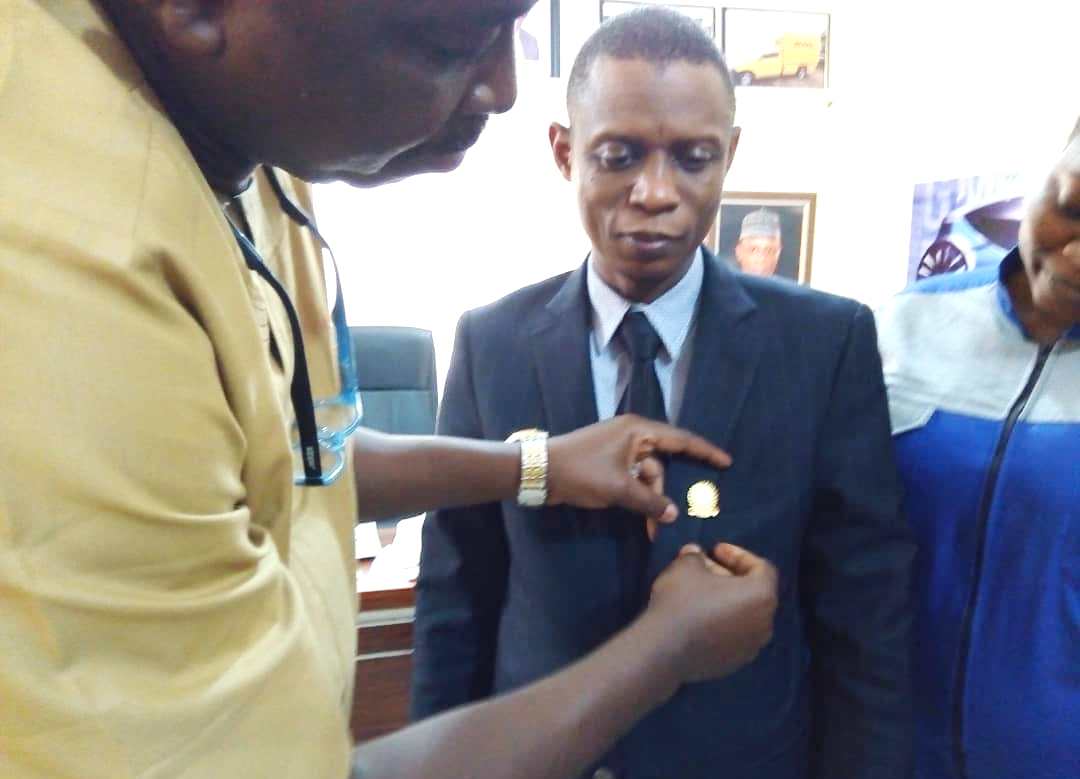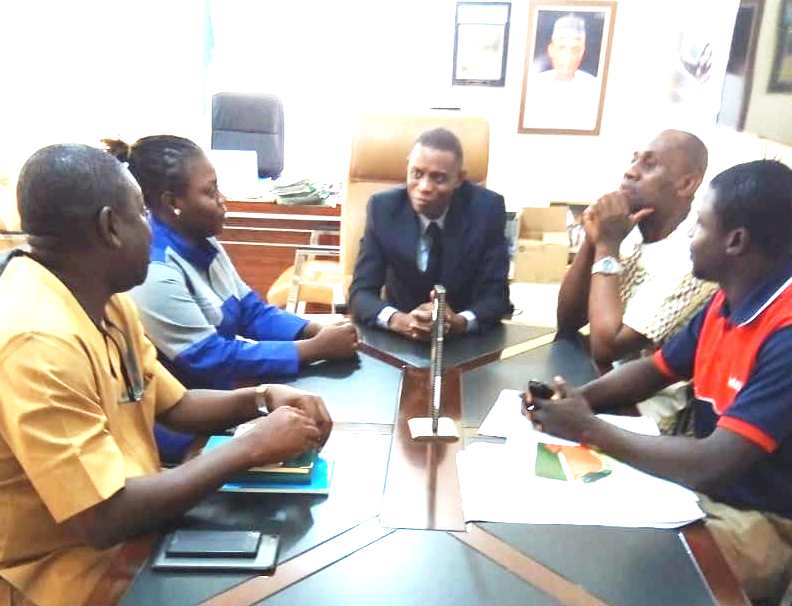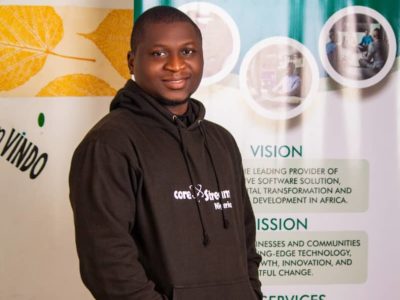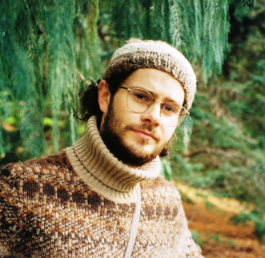Director General of the Nigerian Automotive Design and Development Council (NADDC), Jelani Aliyu, is an automotive/industrial designer and developer. Aliyu gained fame as the designer of the globally renowned Chevrolet (Chevy) Volt. In this interview in Abuja with IT Edge News, Olusegun Oruame and Doris Minimah, Aliyu speaks on the changing narrative for Nigeria’s automobile industry, the drive for local content, affordable vehicles, the future of the automobile sector shaped by technology dynamics and how the NADDC, under him is selling, the Nigerian opportunity to offshore investors including global automobile giants. On his new Jelani Aliyu Foundation, the architectural conceptualist declared that his mission is to reach out, support and inspire those who really don’t have much or can’t do much. During the interview, Aliyu paid host to members of the Nigerian Institution of Mechanical Engineers (NIMechE) led by its national Chairman, Dr. Robinson Ejilah in company of Ms Joyce Daser Adams, CEO/founder of Autolady Synergy Company Ltd.
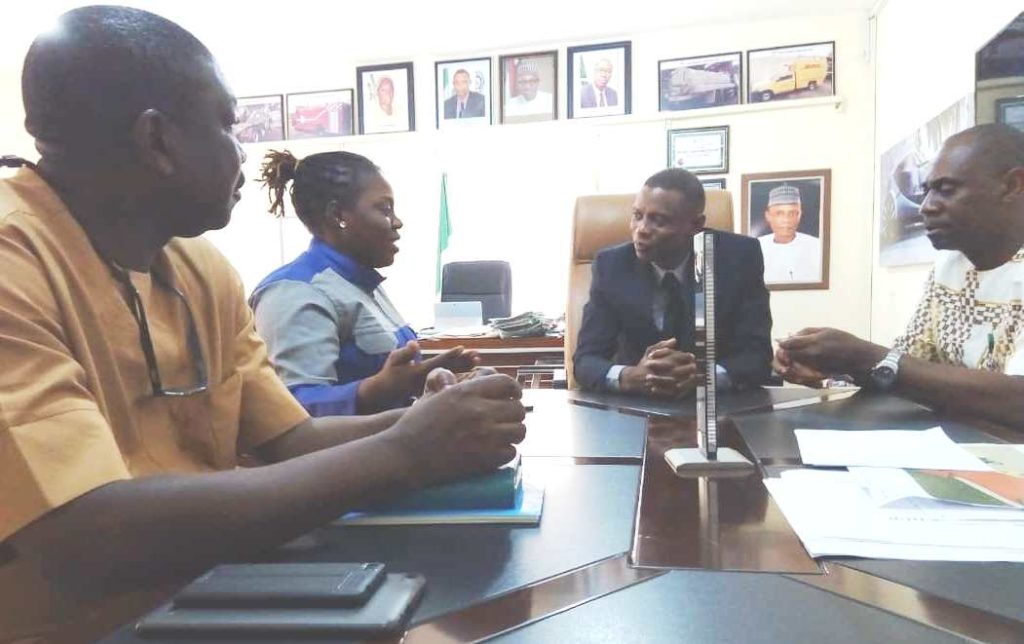
DG of NADDC, Jelani Aliyu during the interaction with National Chairman of NIMechE, Dr. Robinson Ejilah in company of Ms Joyce Daser Adams, CEO/founder of Autolady Synergy Company Ltd. Also present is CEO of Knowhow Media International Ltd (publishers of IT Edge News), Olusegun Oruame.
In managing the NADDC as a public sector establishment and your understanding of the system now, what have been the challenges since you assumed office?
I will begin by saying that it has been quite an adventure in terms of the certain objectives that need to be achieved, and then you also have the building blocks that are not there but that have to be put in place. As we are all aware, Nigeria as a country, lacks a lot of things that needed to be have been done in the last 20 to 30 years but simply weren’t done. So, I believe the challenges for anyone in authority this particular moment in Nigeria is how to bring together the necessary resources in a relatively short amount of time to achieve what will normally take much longer time considering our history. I am very glad that we have been able to bring together different stakeholders and get everybody on the same page, everybody to understand what needs to be done and as a result, we have really gotten a lot of support from the legislature, support from our parent ministry and support also from sister agencies. We have looked at the current status of the automobile sector and said: ‘What are the two most important things that need to be done as soon as possible? We are looking at approaching things from two angles: No 1 is how do we support the OEMs that are already established around the world, those companies whose vehicles we use that are old and out of fashion and dangerous on our roads, how do we turn that around, instead of bringing in old vehicles how do we begin to make those vehicles in Nigeria? The challenge in that has been, yes the market is there, yes opportunity is here but a number of this companies have been hesitant to come into Nigeria; gladly what we have been able to do is begin to convince these heavy weights that Nigeria is the right place. We have managed to begin to sell the Nigerian opportunity to them and that led to Volkswagen, the largest producer in Europe, if not the world, to agree to come back into Nigeria and we believe that it is a big win because Volkswagen, is one company that has a lot of skills, a lot of resources and when they decide to come, a decision like that isn’t taken lightly either by themselves or by the competitors so the very fact that Volkswagen, has agreed to come back into Nigeria is a positive development. We are working every week and we have put teams together that include the NADDC, Federal Government of Nigeria, ministry and Volkswagen. We have put teams together, they have been here twice. We have been to South Africa, we have been to Germany and one of the things that makes us very excited about the Volkswagen is that in the next couple of years, Volkswagen is going to invest as much as 40 billion US dollars into batteries and electric vehicles and we hope that some of that investment would rub off on Nigeria. As we all know, electrification of vehicles is a tidal wave and no automobile ecosystem anywhere can survive if it turns its back to it. The very fact that Volkswagen is coming back into Nigeria and that Volkswagen is going electric shows the commitment that the federal government has towards the future of transportation.
“Technology [for vehicles using electricity] is actually easier and simpler than internal combustion engine, far less moving parts, less likely for something to go wrong, for Africa and Nigeria where maintenance culture is almost absent that is what we need.”
You were at Nnewi months back and part of your commitments is to develop the indigenous auto industry. How much of that has happened particularly when you talk about Nigerian brands like Innoson and how much of support has come from NADDC to see how local capacity and market can be developed and made sustainable?
Innoson has benefitted from the support that NADDC has been giving to companies and we believe that has contributed to the company’s growth. Within the last year and half, Innoson has introduced, at least three new models. Also, CFAO has introduced new models; just about three weeks ago, Peugeot introduced Peugeot pick-up , so there’s really quite a bit of activity going on in the automobile sector. New vehicles are being produced in Nigeria, and a whole lot more than people realize. In terms of local production itself, we are building three automotive industrial plants in Nnewi, Kaduna and Oshogbo. The one in Nnewi we already have the master plan completed, just now on my desk I was looking at the latest submission on the preliminary facilities. We hope in the next two to three weeks the Nnewi project will take off. We are also working with the BoI [Bank of Industry] and other stakeholders to get the financial clause on how best to source the capital. We met about two weeks ago with the potential developers so really; quite a bit of activity has gone on. Stakeholders have joined the bandwagon and we are moving very close towards making the projects a reality. There have been challenges but we have been able to overcome them. We hope to have same type of momentum apply that to Kaduna and Oshogbo; get interested local stakeholders and other national players to get the projects moving. We were in China last year and we met with two construction companies that have also shown interest in Nnewi. So we hope to bring them into the country as developers and as take-off conduits. The whole objective is to provide a centralized location with all the necessary infrastructure, electricity, road networks, connectivity; make it almost like a plug and play concept. We are also working with NACAM of South Africa, a consortium of automobile component manufacturers who are very interested in coming in – there’s a lot of underground work being done.
Jelani Aliyu: “Yes! The market is there, yes opportunity is here but a number of this companies have been hesitant to come into Nigeria; gladly we have been able to convince these heavy weights that Nigeria is the right place. We have managed to begin to sell the Nigerian opportunity to them and that led to Volkswagen to agree to come back into Nigeria”
By 2030, most of Europe and Asia would have completely shifted to production of electrified cars. Is the fear real that Nigeria and rest of Africa would be a dumping ground for old automobile technologies?
Personally, I have always believed that technology is not the only answer but it is our best bet in moving forward, and in raising the standard of living of millions of Nigerians. Take for example, the cell phone. Before the cellular technology, very few people had landlines and even then it hardly worked and along came this technology that made it cheaper, faster, more efficient and everybody is now connected. We hope to do the same thing for the automotive sector. Two things about vehicle electrification, usually when you bring up the argument a lot of people say you must be smoking something because you can’t even power homes, how could we power vehicles using electricity? That technology is actually easier and simpler than internal combustion engine, far less moving parts, less likely for something to go wrong, for Africa and Nigeria where maintenance culture is almost absent that is what we need. Then all these companies that we are trying to bring in, the Volkswagen, the Nissan, the BMW, everybody is going electric, so if we don’t jump unto the bandwagon, if we don’t prepare ourselves to be able to understand, adopt, transfer, maintain and repair that technology we might be sent back into the stone ages. If we say Nigeria will continue with fossil powered vehicles, we don’t care about what the world is doing since NEPA is not good, we will stay with petrol vehicles, then you go out there to buy new vehicles in the international market, you ask someone to bring in vehicles into Nigeria and the only thing available might pretty soon only be electric, unless we put in the necessary infrastructure, we will just be left behind and that is why we need a policy to support that technology transfer. But before we get to the policy, before we sit in front of legislature and say help us pass this policy, help us make this a bill to support the industry, we need to have that technology here in Nigeria, touch it and fill it. Last week we met with the vice chancellor of Uthman Danfodio University and the vice chancellor of University of Nigeria Nsukka and representatives of University of Lagos , University of Ibadan – we are doing a pilot programme with these universities. We will be bringing in a number of these electric vehicles and we will have a couple of them at these campuses for the students to be engaged in that technology and begin to understand that technology, begin to understand how that technology could be adapted to Nigeria, begin to run courses on electrification and then also on the electric charging stations. We met in China with the manufacturers of both electric buses, electric charging stations who will be working on this pilot programme. So. once we do that we will be in the best position to draft an electric vehicle policy that we as the government will push forward to support the manufacturers, the producers and entrepreneurs going into electrification.
“Everybody is going electric, so if we don’t jump unto the bandwagon, if we don’t prepare ourselves to be able to understand, adopt, transfer, maintain and repair that technology we might be sent back into the stone ages.”
You are convinced that the leapfrogging process can take place here?
Yes! It’s the only option we have, actually.
The Jelani Aliyu Foundation
What is the motivation for your new foundation and why healthcare intervention, why not something else?
I have always been excited by the phenomenon that individuals can decide to make a difference. Societies that have succeeded and made progress have never really relied just on government to do everything, the government can do only so much but the individual have to have that commitment, that passion to also make a contribution. The Jelani Aliyu Foundation has three objectives: the first is the Rural Outreach – the Rural Health Connect, this is the first one we have done. We will also be doing one on Education and inspiring the young ones to achieve their best by mentoring them. The third will be Environmental Protection and Sustainability. We look at what has been achieved with the Rural Health Connect, this is an initiative that aims at bringing volunteer health professionals to communities in need. I have realized over the years that quite a majority of our population live in the rural settings and a lot of the current medical logistics vehicles are not really designed or configured for Nigeria or Africa. This initiative also looks at how to take medicine and healthcare professionals to remote areas. One of the things we have is a vehicle that is optimized for off road, it is not just an ordinary ambulance or EMS vehicle, it is one that is optimized to reach and access remote areas, that capability of being able to bring together volunteer professionals and having the necessary platform to take them to remote areas is really what came together to create the main concept of bringing medical services to rural communities. I have always been fascinated by the mission to reaching out to those who really don’t have much or can’t do much, not that they don’t want to but they are caught up in a situation that doesn’t allow them to either achieve their best or to really do certain things that are necessary. The exciting thing about it is that this foundation, by the power of what we have been able to achieve, is inspiring many people to come together to create that synergy to go out there as a team to make a difference. We actually started with just about two or three doctors but before the week was out we have gotten close to fifty volunteers, doctors, dentists, gynaecologist, nurses, all came together – a lot of people volunteered. That is what the foundation is all about to inspire people to come together and achieve things bigger than themselves.
“I have always been fascinated by the mission to reaching out to those who really don’t have much or can’t do much, [because] they are caught up in a situation that doesn’t allow them to achieve their best”
If you have the privilege to look back in 10 years from now and assess the foundation, what will give you a sense of fulfilment?
The biggest will be to look back and very openly see that the young ones have been inspired, and empowered to understand what their strengths are and then supported and inspired. I love that word inspiration, to inspire because when people achieve the impossible it is most usually because of inspiration. We all have a certain power within us but for most people, this power lies dormant. Inspiration can reach into those hearts. Inspire them to become superman and superwoman. I very much hope that this foundation will be able to do that, not necessarily to give out resources, yes we try to do that but to really empower someone to achieve their best. I believe that what really makes a difference is waking up that dormant capability within an individual. In a number of books that I have read about people that have succeeded, it is not that they had access to resources that others didn’t have but it is that belief that was instilled in them; they grabbed that belief and worked with it and this allowed them to take what people take for granted and really create new heights.


